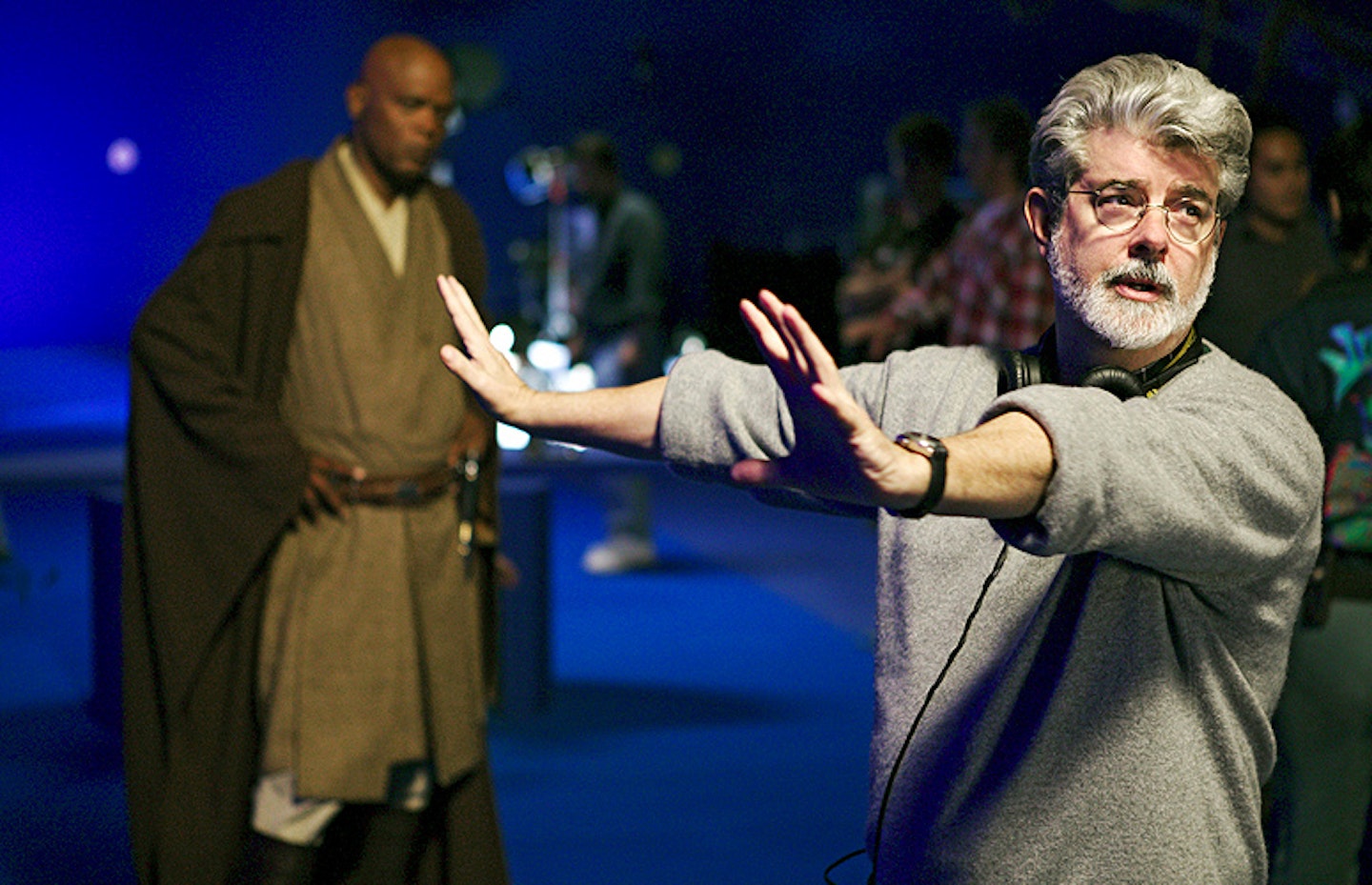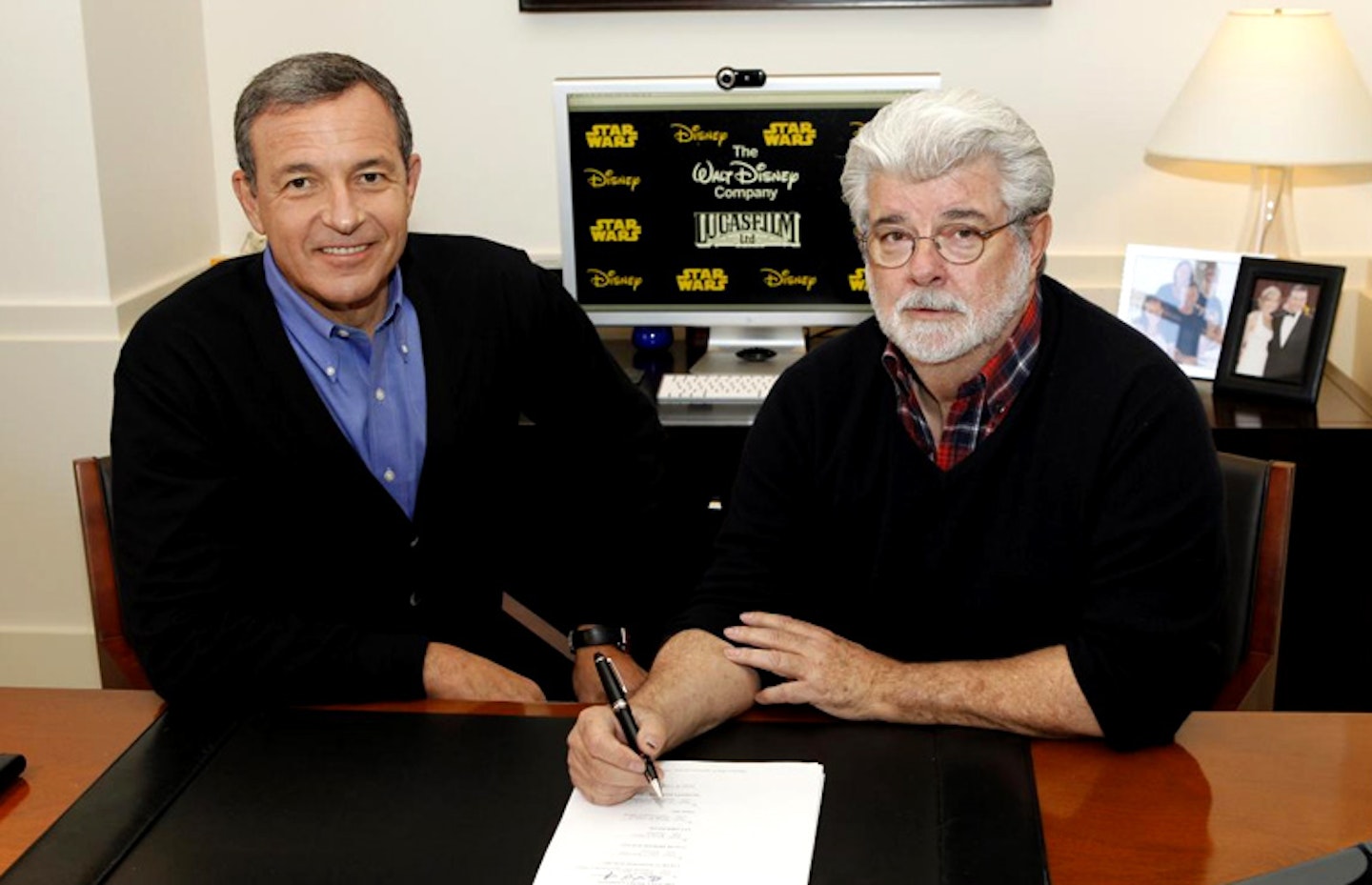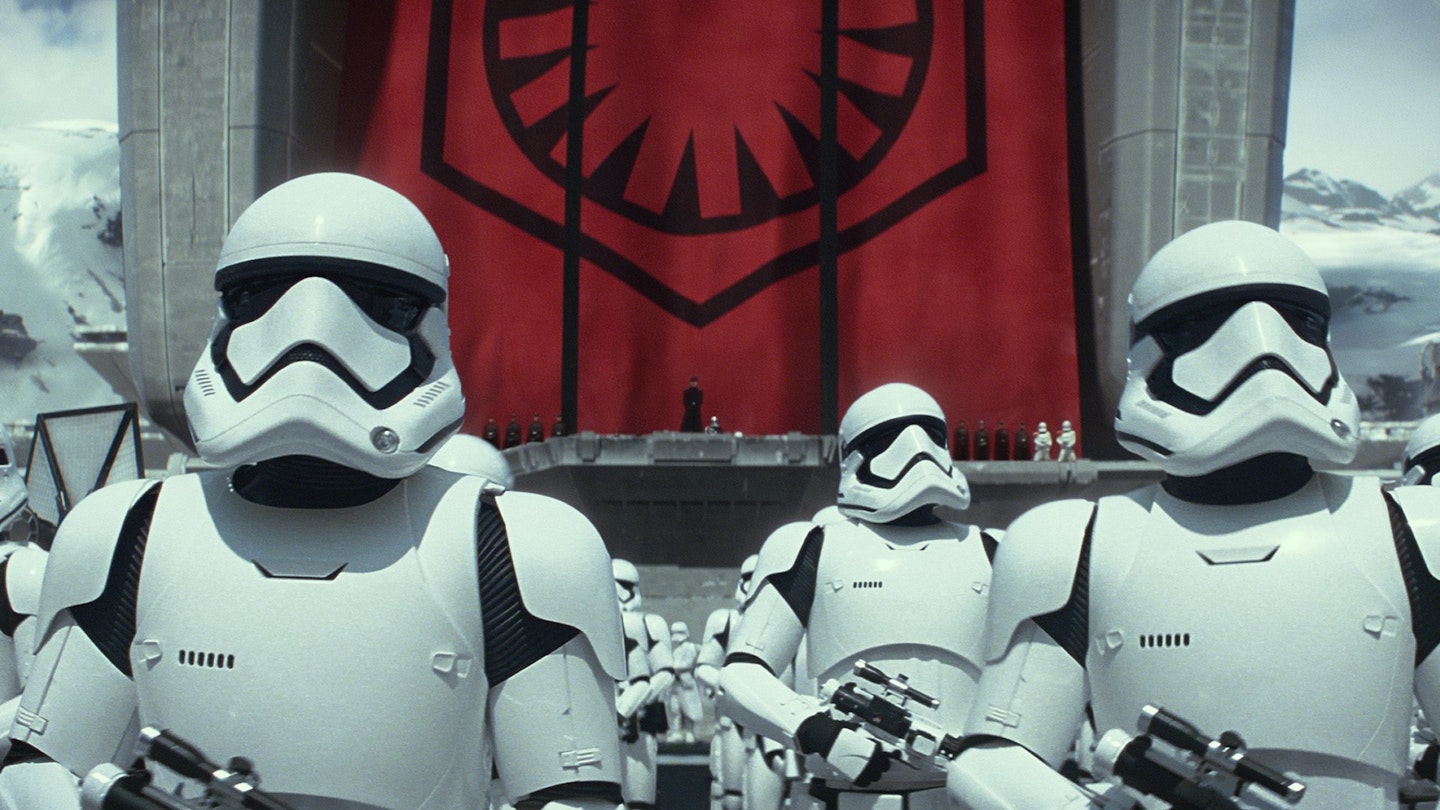
THE LAST FEW YEARS HAVE BEEN AN UNCERTAIN TIME FOR STAR WARS. Revenge Of The Sith finished the prequel trilogy in style but without the triumphant flourish and lingering high that many had longed for. For seven years we lived in a world where Star Wars as a movie property had been left behind, abandoned like a once-beloved childhood toy whose colours have faded. The franchise lived on through games, toys and the (admittedly good) Clone Wars animated series but the saga had come to a close and we were the poorer for it. That all changed today, however, with the news that Disney has bought Lucasfilm and plans on releasing Episode VII in 2015.
George Lucas made it clear after Sith that, whatever he may have said in the past, he had no intention of starting work on a new cinematic trilogy to follow on from Return Of The Jedi – nor would he abandon the series into someone else’s hands. That was probably the right decision for the time: overblown accusations of childhood-rape and money-grabbing were already rife from entitled fanboys, and had Lucas handed over the reins he would have faced further accusations of cashing in. Now, however, we’ve had a little time to miss the franchise, and things look a little different. There is no cause to think that every future Star Wars film should underwhelm, or just whelm, as the prequels did. There is, in fact, every reason to hope that Episode VII – and whatever follows it – could be not only good but truly great. The success of Avatar surely demonstrated a hunger for space opera that’s currently being ignored by studios chasing after fantasy dollars. We can argue about whether superhero movies like Thor and The Avengers qualify as sci-fi (they probably do, just) but they’re not Star Wars. That gap in the market is in the same place it ever was, and while studios cast about for “the next Harry Potter” Disney may end up looking extremely smart for turning back to the one proven space franchise.

 The input of new blood could be exactly what this franchise needs.
The input of new blood could be exactly what this franchise needs.

 Those fanboys who have – rather unfairly– become rabidly anti-Lucas can take comfort from the fact that the director has stepped back from the reins of power, handing Lucasfilm first to Kathleen Kennedy and now to Disney. There should be no question that Lucas can make great movies (stop carping at the back: if he hadn’t made two or three great Star Wars films you wouldn’t be so angry at him now), but his very best efforts on Star Wars have seen him collaborate with other people. Lawrence Kasdan in particular, as screenwriter on Episodes V and VI, and director Irvin Kershner on Episode V, improved the dialogue and tightened the character scenes. The input of new blood could be exactly what this franchise needs. It’s one of those cases where the retirement of the original creator need not derail the franchise as a whole, and should make the fans happier rather than discontent.**WHAT'S ALSO INTERESTING IS WHERE LUCAS HAS CHOSEN TO PLACE HIS BABY. **Disney has gone on something of a spending spree in the past few years, buying Pixar for $7bn and Marvel for about the same price as this Lucasfilm deal, $4bn. It’s easy to make a kneejerk assumption that this big business is up to no good, but the evidence simply doesn’t support it. Disney are big, no question, but the fit is a pretty logical one. Disney has had dealings with Lucas for years – see the theme park rides, for instance – and has recently been focusing on exactly the same sort of family audience that the original films catered to. Disney’s not just a place for cutesy cartoons these days; their meat and potatoes are films like Pirates Of The Caribbean and, lest we forget, Avengers. Those films show a mix of comedy, action, peril and adventure that could have come straight from the Star Wars playbook.
Those fanboys who have – rather unfairly– become rabidly anti-Lucas can take comfort from the fact that the director has stepped back from the reins of power, handing Lucasfilm first to Kathleen Kennedy and now to Disney. There should be no question that Lucas can make great movies (stop carping at the back: if he hadn’t made two or three great Star Wars films you wouldn’t be so angry at him now), but his very best efforts on Star Wars have seen him collaborate with other people. Lawrence Kasdan in particular, as screenwriter on Episodes V and VI, and director Irvin Kershner on Episode V, improved the dialogue and tightened the character scenes. The input of new blood could be exactly what this franchise needs. It’s one of those cases where the retirement of the original creator need not derail the franchise as a whole, and should make the fans happier rather than discontent.**WHAT'S ALSO INTERESTING IS WHERE LUCAS HAS CHOSEN TO PLACE HIS BABY. **Disney has gone on something of a spending spree in the past few years, buying Pixar for $7bn and Marvel for about the same price as this Lucasfilm deal, $4bn. It’s easy to make a kneejerk assumption that this big business is up to no good, but the evidence simply doesn’t support it. Disney are big, no question, but the fit is a pretty logical one. Disney has had dealings with Lucas for years – see the theme park rides, for instance – and has recently been focusing on exactly the same sort of family audience that the original films catered to. Disney’s not just a place for cutesy cartoons these days; their meat and potatoes are films like Pirates Of The Caribbean and, lest we forget, Avengers. Those films show a mix of comedy, action, peril and adventure that could have come straight from the Star Wars playbook.
But far more significant is this: Disney has emphatically not tried to fit its new acquisitions into a corporate model of doing business. If anything, in the case of Pixar, the influence has gone quite the other way, with Disney bringing Pixar’s John Lasseter back to the Mouse House to revive their struggling animation department (and head their Imagineers, and develop their direct-to-DVD franchises) while leaving Pixar’s culture more or less untouched. With Marvel, too, there’s no sense that Kevin Feige is being second guessed as he crafts out Phase Two of the Avengers’ joint and individual adventures. When a culture has been working, Disney has left it to work. The worst you can say about the studio is that they place quite a bit of emphasis on ancillary rights, by which measure Cars is a more successful Pixar movie than Up, but as long as the toy selling and theme parks don’t materially affect the content of films, if you don’t like that stuff just don’t buy it and you’ll be fine. Besides which Star Wars fans, of all people, can hardly complain about over-commercialisation or toylines inspired by their films.
Whether Lucasfilm can be said to be a culture that is working right now is up for debate, but the signs today are that there’s a sense of purpose and movement that were lacking in the stagnant years since Sith, when the TV show was stalled for budgetary reasons and only the Clone Wars cartoon continued to fly the flag. Kathleen Kennedy took over as co-chair of Lucasfilm in June, and now becomes its president. Judging by her CV to date, and her long history of collaborating with Lucas on the Indiana Jones if not the Star Wars franchise, she should have a pretty clear idea where she’s headed. She’s also a woman with a passionate commitment to storytelling, which should rule out much talk of trade embargoes and taxes.

FIRST UP FOR DISNEY-LUCASFILM, OF COURSE, IS EPISODE VII. Lucas said last night that he had mapped out a treatment for three more films, but didn’t claim that he was writing the screenplays. Kennedy now has to assemble a creative team to get those moving forward – and we suspect she’ll have her pick of Hollywood’s best screenwriters and directors. After all, virtually every director and screenwriter currently at the height of their career grew up on Star Wars, because the vast majority of successful filmmakers overlap precisely with Lucas’s fanbase: geeks in their thirties and forties. Star Wars was seismic in its influence, formative in its effects on filmmakers, and we doubt there can be more than two or three directors in the whole of town who wouldn’t start drooling at the prospect of playing in that universe (the arthouse guys might not admit it, but come on! Everyone secretly wants a lightsaber). If Orson Welles called RKO Studios “the biggest electric train set a boy could have”, Disney just bought the biggest, most mouth-watering collection of classic action figures ever assembled.

 The great strength of the Star Wars films was their strong sense of good vs. evil, and that needs to stay in place.
The great strength of the Star Wars films was their strong sense of good vs. evil, and that needs to stay in place.

 Immediately after the announcement, Twitter went mental with directorial suggestions. The most popular name, Joss Whedon, has the small matter of Avengers 2 due the same year, so barring an attempt to get himself fired so he can take over Star Wars instead (a risky strategy, given that they’re both at the same studio) he’s out of the running. Brad Bird’s name has been bandied about (Kennedy’s story-focus would certainly gel well with Pixar alums), and Andrew Stanton’s (whether he’d want to tackle sci-fi for Disney again so soon is up for debate), but why stop there? At the risk of blowing the internet’s collective mind, consider this: Christopher Nolan has a gap in his schedule right now. David Fincher hasn’t got anything listed for 2015. Sam Mendes is on a post-Skyfall break. Danny Boyle’s probably nearly recovered from the Olympics by now. Name a director, and the chances are Disney can at least sit down and discuss the prospect with him. Steven Spielberg should’ve finished Robopocalypse before 2015, right? (For the record, we don’t think that’s likely.)The same goes for writers – and if you get a great writer and director lined up, the cast will follow. Which brings us to thornier questions of plot and setting. We suspect that any attempt to recast Han, Luke and Leia (particularly Han) would be fraught. While Nathan Fillion is an acceptable Solo substitute, he is not actually Han Solo. Nor is Ryan Reynolds, or Aaron Eckhart, or anyone else we can think of.
Immediately after the announcement, Twitter went mental with directorial suggestions. The most popular name, Joss Whedon, has the small matter of Avengers 2 due the same year, so barring an attempt to get himself fired so he can take over Star Wars instead (a risky strategy, given that they’re both at the same studio) he’s out of the running. Brad Bird’s name has been bandied about (Kennedy’s story-focus would certainly gel well with Pixar alums), and Andrew Stanton’s (whether he’d want to tackle sci-fi for Disney again so soon is up for debate), but why stop there? At the risk of blowing the internet’s collective mind, consider this: Christopher Nolan has a gap in his schedule right now. David Fincher hasn’t got anything listed for 2015. Sam Mendes is on a post-Skyfall break. Danny Boyle’s probably nearly recovered from the Olympics by now. Name a director, and the chances are Disney can at least sit down and discuss the prospect with him. Steven Spielberg should’ve finished Robopocalypse before 2015, right? (For the record, we don’t think that’s likely.)The same goes for writers – and if you get a great writer and director lined up, the cast will follow. Which brings us to thornier questions of plot and setting. We suspect that any attempt to recast Han, Luke and Leia (particularly Han) would be fraught. While Nathan Fillion is an acceptable Solo substitute, he is not actually Han Solo. Nor is Ryan Reynolds, or Aaron Eckhart, or anyone else we can think of.
But failing to recast that trio means that you face issues of setting. Without them, you either move to the outskirts of the fallen Empire and tell a smaller story set around the same time, or you have to move into the future. The past is right out because a) the word “prequel” is still franchise poison for this series and b) calling it Episode VII and setting it in the past would really upset the OCD among us. So we’re talking a good 30 to 40 years later as a minimum, which could mean that the original cast appear in smaller roles, or not at all if it’s set much further into the future than that. Either way, the new film will have a bit of a job of world-building to do in order to re-establish this new time period or setting, so it will need a great script. Or, at the very least, a killer opening crawl.
Were it up to us (and unaccountably, Disney is yet to call) we’d ground these new films around a Jedi / Sith clash – albeit not necessarily with only Jedi and Sith leads. The great strength of the Star Wars films was not their moral ambiguity but their strong sense of good vs. evil, and that needs to stay in place. There’s still a wealth of story that can be built around such a monumental conflict, and there’s still room for Han Solo-like unaligned figures in-between the goody-two-shoes Jedi and their dark foes, but if there were no Jedi or Sith we might as well be in any old space opera.
**THE FILM ALSO NEEDS TO DISTINGUISH ITSELF FROM AVATAR, FROM JOHN CARTER, AND FROM ITS OWN PREQUELS. **Our suggestion would be that one way to do that is to keep CG to a minimum and try to use as many practical effects as possible. For one, it will distinguish Episode VII from the sometimes CG-slap happy prequels. For another, it will recall the original films. For a third, the fans will love that stuff; look at the Nolan Batman films.
At this stage, of course, such questions are entirely speculative and are likely to remain so for a good few months to come. But there can be no question that this is a big day for Star Wars, for Lucasfilm, and for Disney, which has cemented its status as a studio built to cater for huge franchises along without necessarily churning them all out in its own image. As discussed here, Disney is focusing its business plan on a few huge films a year rather than a slate of mid-level contenders, and to do that it needs exactly this sort of mega- franchise to build upon. It’s a high risk (John Carter), high reward (Avengers) tactic, but as long as they pursue this plan by focusing on making great films, it should be of basically no interest to those outside the business. Admittedly, inside the business it’s pretty seismic. Warners, having wrapped up its big earner with the end of Harry Potter and facing a Batman reboot on Justice League, suddenly faces a challenger as the biggest franchise producer in town; the other studios will be looking closely at Disney’s plan and, we suspect, largely fitting in their own releases to fit in around these behemoths rather than trying to grab the same turf.
Because let’s face it: everyone’s going to be interested in a new Star Wars movie. You can be as cynical as you want about the chances of it matching up to what’s gone before; you can doubt Lucas’s continued involvement, however minor, if you like; you can swear you’ll boycott it and that Jar-Jar Binks shot JR before ruining your childhood. But you’re still going to want it to succeed. It’s Star Wars, people, and it’s coming back.
Today is a good day.
